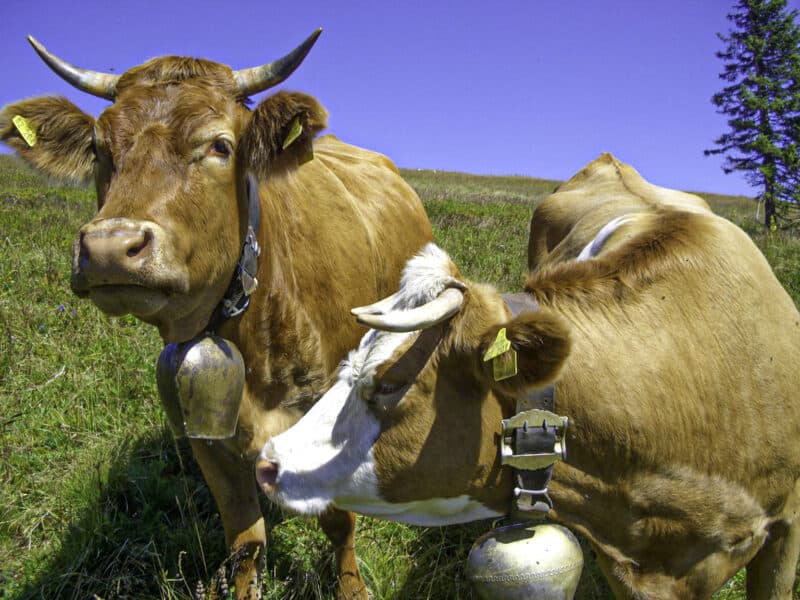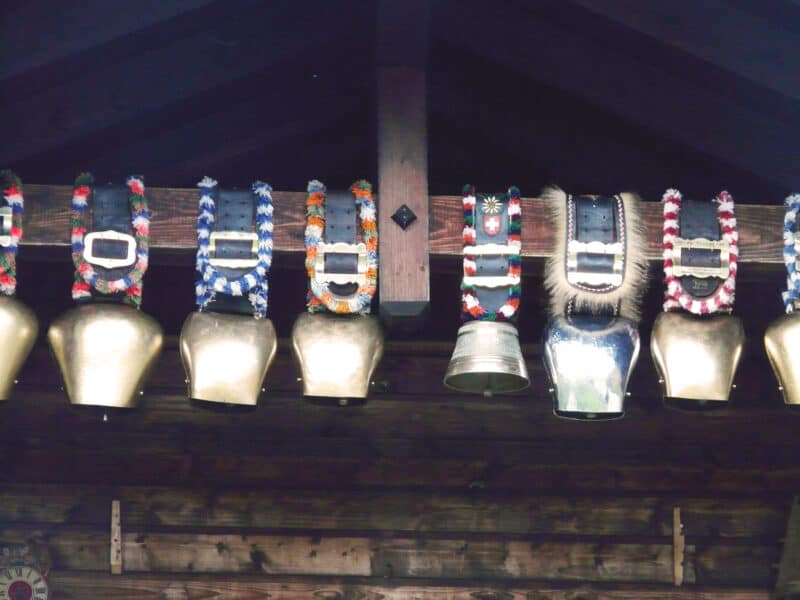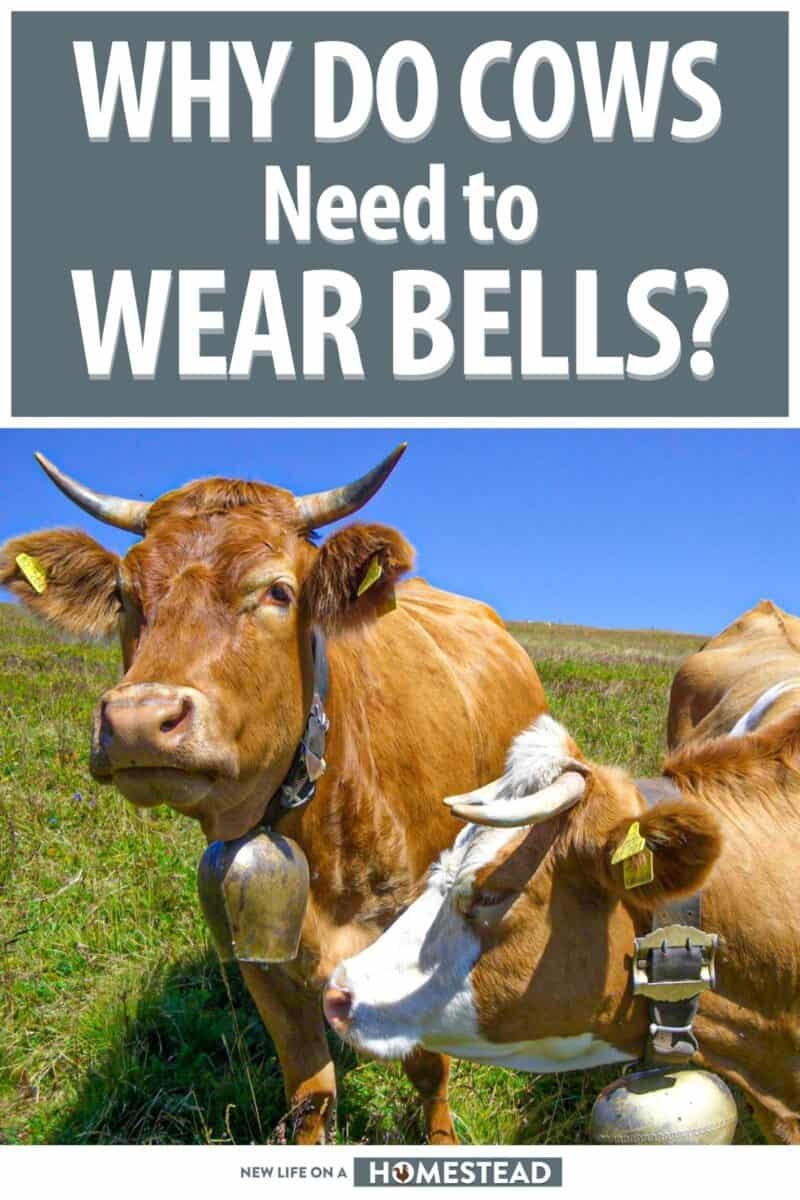When you think of cows, the first thing that probably comes to mind is milk. The next thing that probably comes to mind is the sound of cowbells.

But have you ever stopped to ask yourself why we associate cows with the clanking sound of those bells? It’s a valid question…
Why do cows wear them in the first place?
Cows wear bells to help a farmer locate his cows at a distance, or provide reassurance that they are still nearby. They may also help an isolated or lost cow be found more easily.
We’ll discuss more of the reasons why cows wear bells, what kind of bells are typically used, and whether or not they are harmful or detrimental to cows in the rest of this article.
Bells Help Farmers Keep Tabs on Their Cows
The most obvious reason cows wear bells is so that farmers can keep track of them.
Cows are not the most timid of creatures and they have been known to wander off into the woods or even into a neighbor’s field in search of food.
Sure, they look like they just walk around sedately or stand blithely in a field most of the time, but cows are capable of covering quite a lot of distance very quickly.
One minute they are there; the next minute they are out of sight and gone!
If a cow happens to get lost, the sound of the bell will alert the farmer to its location so he can go and retrieve it.
This is especially useful on large farms where there may be hundreds of cows spread out over many acres.
This is doubly useful in the event of bad weather or a disaster where cows might become scared or disoriented and scattered.
Trying to track down a dozen stragglers heading to the four corners of the Earth over a large, open range can be a nightmare.
The clanking of a cowbell can be heard over a long enough distance to make zeroing in on them significantly easier.
Bells also provide reassurance to farmers that their cows are still nearby.
If a farmer hears the sound of bells while he is working about his farm, he knows that his cows have not wandered too far away and are still close by.
But when things get quiet, too quiet, that means only one of two things: the cows are at rest or they have gone!
In summary, cowbells are a simple but effective way for farmers and farm hands to keep track of cows in the area.
Bells Can Also Warn of Charging Cattle!
While the primary purpose of cowbells is to help farmers keep track of their cows, they also serve another important purpose: They warn people who might be distracted that a cow is charging!
Most cows are not thought to be naturally aggressive animals but they can be if they feel threatened, are protecting young or are startled.
Bulls, in particular, may be territorial or attack anyone who comes near. But if any cow with young feels like she needs to act to defend herself or her calf, she may charge.
And when any 1200-pound animal is charging at you, the resulting impact is not going to be pretty.
The sound of a rapidly clanging cowbell is a primitive but effective early warning system that can alert nearby people that there is a charging cow in the vicinity.
Hopefully, this will give them time to get out of the way!
This is especially important for joggers, cyclists, and hikers who may not be expecting to encounter a cow on their walk or ride, and also for workers on a farm who might be distracted with other tasks on their daily rounds.

What Kind of Bells do Cows Wear?
The type of bell worn by a cow can depend on the farmer’s preference or what is available.
The most important factor is that the bell be loud enough to be heard at a distance, so bells made of metal are usually preferred.
These bells are not small jingle bells, but distinctly large and oversized, with a correspondingly loud report.
Brass, bronze and iron are all common materials used for making cowbells; each is durable and will withstand being banged against trees, rocks and other obstacles that cows may encounter while grazing.
They must also be of heavy construction in order to resist attempts at scratching or rubbing at the bell or the collar that holds it.
Speaking of collar, the collar that holds a cowbell is typically made from heavy leather with a buckle closure, although some farmers might opt for a cheaper cloth or nylon version.
Whatever type is used the closure system must be secure enough to resist incidental contact or removal, but soft enough that it does not unduly irritate the cow wearing it.
Do Cowbells Hurt or Aggravate Cows?
Now that we’ve discussed some of the reasons why cows wear bells, you may be wondering if they are harmful to the cows in any way.
The short answer is no, cowbells are not harmful to cows. Properly fitted and designed, they will not injure the cow, or interfere with grazing.
In fact, most cows seem to take little notice of them once they get used to wearing them.
That being said, cowbells are heavy, and some individual animals seem to take a specific exception to wearing them.
In such cases, a farmer might opt to remove the cowbell if it causes the animal undue stress.
Additionally, calves are rarely if ever given a cowbell because their rapid rate of growth would necessitate constant adjustment of the collar, and furthermore they will generally never be far enough away from their mother and the rest of the herd that locating them is a bother.
The only potential downside to cowbells is that they can be quite loud, especially when there are several hundred cows all wearing them at once!
This can make it difficult for farmers and workers on a dairy farm to communicate with each other or hear other sounds.
Some people express concern that cows’ hearing will be affected by the constant, high-decibel clanking of the bells they wear, but most studies are inconclusive.
But in response to constant (if misguided) concern from certain quarters certain farmers have started to experiment with quieter, lighter, electronic “cowbells” that emit a periodic beeping sound or chime instead of the usual, loud and continual clanging noise.
These may be a more suitable option for farms where the noise level is already quite high, or as a remotely activated option to help prevent loss of a herd or individual cow.
More Cowbell!
In conclusion, cowbells are used as a way to help farmers keep tabs on their cows, as well as warn people of charging or oncoming cows.
They serve an important purpose on the farm, and are generally not harmful to cows.
While some farmers have taken to letting their herds roam without bells, the traditional metal cowbell is still a common fixture on many farms.

Tom has lived and worked on farms and homesteads from the Carolinas to Kentucky and beyond. He is passionate about helping people prepare for tough times by embracing lifestyles of self-sufficiency.

My grandpa taught me how to call cows wherever they are, they will come to you even if the are looking for food or lost. I give all the cows the same name. I call all my cows, mama cows I call them with a feed bucket and a horn on my side by side or even a truck. Once they all come to me I feed them pellets. I don’t feed all the time that would cost to much in your feed bill. They learn my vehicle and my voice. I’m not able to ride a horse anymore so my horse is my side by side or my truck. I have 635 ac with Cypress swamps, hard wood and these invasive pepper tree that you can even see through.